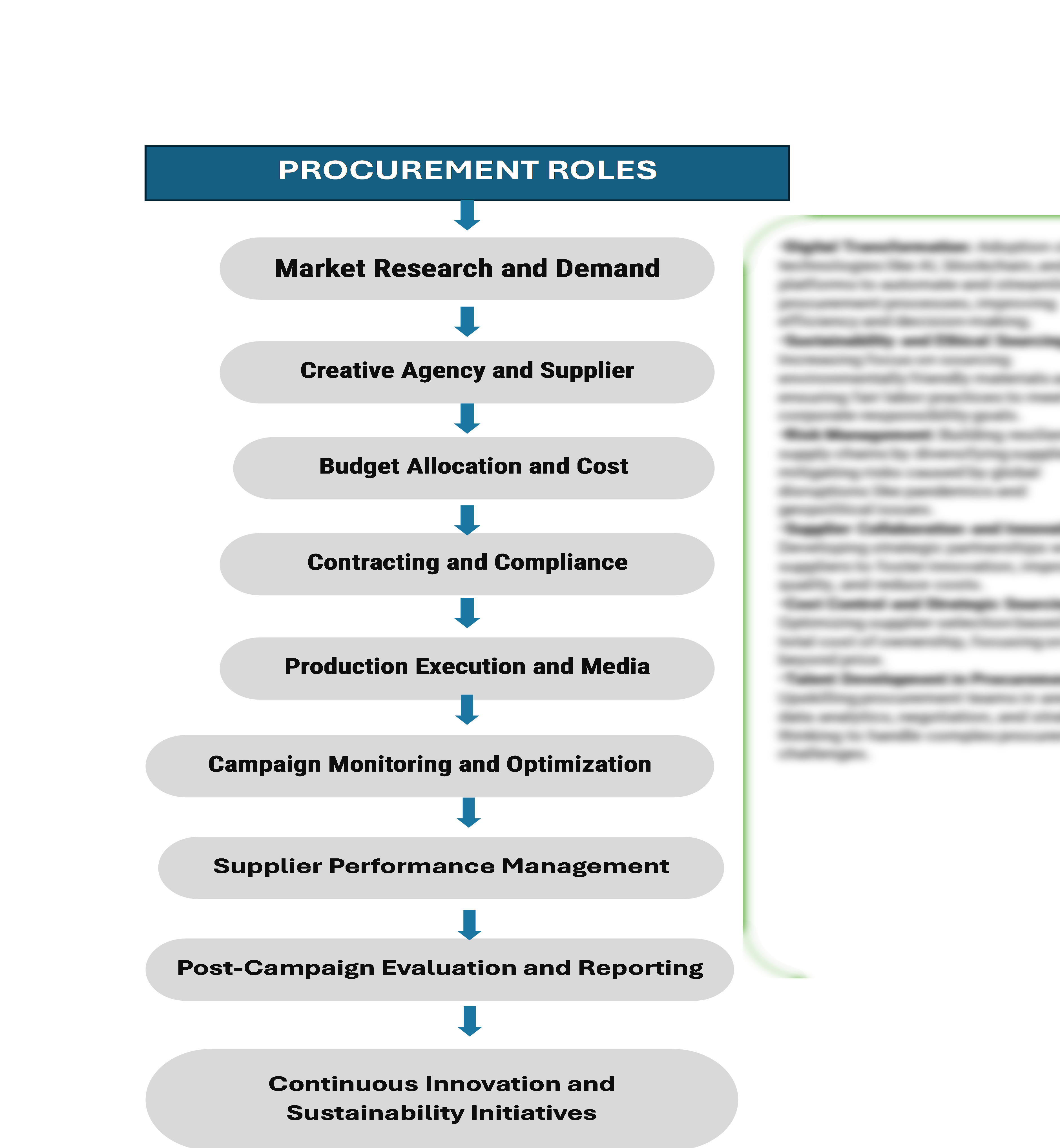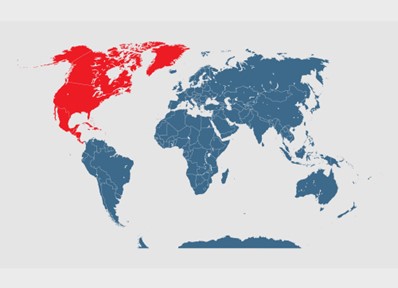The global advertisement production market is projected to reach $752.8 billion in 2024, a 4.6% growth from 2023. Digital channels dominate, with connected TV and retail media ad spend rising sharply, contributing to digital’s 59% share. Programmatic advertising leads cost-saving efforts, accounting for 70% of digital spend. As brands seek to maximize effectiveness, new metrics such as ad spend per capita and GDP-based benchmarks offer insights across regions, led by the U.S., UK, and Japan. The advertisement production market is experiencing strong growth, propelled by digital transformation and evolving media consumption habits. Here’s an overview of the current outlook and trends projected through 2032 Additionally, we address future procurement challenges and emphasize the importance of digital procurement tools in accurately forecasting market needs to keep clients ahead in this dynamic landscape. Strategic sourcing and procurement management play a crucial role in streamlining the procurement process for advertising production development. As competition intensifies, companies are leveraging market intelligence solutions and procure analytics to optimize their supply chain management systems. Market Size: The advertisement production market is projected to achieve a significant compound annual growth rate (CAGR) of around 16% from 2024 through 2029. This growth is driven by rising investments in digital and video production services across various sectors globally, estimated to reach a substantial valuation by 2032. Growth rate: 16% Sector Contributions: Technological Transformation and Innovations: Advances in digital media production, including AI-driven content creation, augmented reality (AR), and virtual reality (VR) applications, are enhancing the creativity, effectiveness, and engagement of advertisements. Innovations in automated video editing, personalized targeting algorithms, and data analytics are transforming how advertisements are produced and delivered. In addition, supplier performance management and vendor performance assessment are becoming increasingly critical for companies in this competitive landscape, ensuring timely delivery, cost efficiency, and high-quality output in advertisement production. Funding Initiatives: Increased spending on social media platforms and digital advertising, particularly by industries such as retail, travel, and media, underscores a shift in budget allocation toward platforms that offer precise audience targeting and measurable ROI. Regional Insights: Growth Drivers: Pricing Outlook for the Advertisement Production Market: Spend analysis The advertisement production market is currently characterized by a dynamic pricing environment, with a projected growth rate of XX% in total media advertising revenues for 2024. This growth is driven primarily by increasing investments in digital media and the adaptation of strategies to meet evolving consumer behaviours. The graph shows a general upward trend in pricing for advertisement production market, likely due to rising costs, increased complexity, and growing demand. However, there may be fluctuations influenced by economic conditions, technological advancements, and competitive dynamics. Comprehensive Price Forecast: Several key factors are influencing this upward trend: While traditional media, particularly linear advertising, faces significant challenges, major events like the Olympic Games and upcoming election cycles are likely to temporarily enhance advertising revenues. Local television ad sales could increase by XX%, although non-cyclical national TV ad sales might see a decline of about X%. Strategic Insights: To effectively navigate these shifts, stakeholders should consider implementing proactive procurement strategies. The integration of artificial intelligence in campaign management is becoming essential for enhancing advertising effectiveness while controlling costs. By concentrating on digital and hybrid advertising solutions, companies can seize new market opportunities and maintain their competitive edge. Cost Breakdown for the Advertisement production market: Total cost of ownership TCO and cost saving opportunity In the advertisement production market, implementing effective procurement strategies can significantly reduce costs and enhance operational efficiency. Bundling media purchases allows companies to secure bulk ad placements at discounted rates, particularly in the digital space. Outsourcing specialized functions, such as video editing or animation, minimizes the need for in-house personnel, leading to lower fixed expenses while maintaining high-quality production standards. Establishing in-house production capabilities for recurring content, like social media ads, further reduces reliance on external agencies, thereby lowering long-term costs. Additionally, employing digital asset management (DAM) systems streamlines the organization and reuse of creative assets, cutting production times and eliminating redundancy. Sustainable sourcing for physical advertising materials not only aligns with consumer demand for eco-friendly practices but can also yield long-term cost benefits. Finally, automating routine processes, such as scheduling and report generation, reduces manual labour costs and improves overall efficiency. These strategies collectively enable companies to maximize their advertising impact while managing budgets effectively. Supply and Demand Overview of the Advertisement Production Market: Demand-Supply Dynamics and Buyer Intelligence for Effective Supplier Relationship Management (SRM) The advertisement production market is experiencing strong growth driven by the increasing demand for digital marketing, social media campaigns, and video content. Demand is particularly high due to the need for innovative and engaging advertising content across various platforms, supported by collaborations between brands, creative agencies, and media outlets. Demand Factors: Supply Factors: Regional Demand-Supply Outlook: Advertisement Production The image shows growing demand for Advertisement production market in both North America and Asia, with potential price increases and increased competition North America: Leading the Advertisement Production Market North America, particularly the U.S. and Canada, holds a significant position in the advertisement production market, characterized by: North America remains a key hub Advertisement production market innovation and growth Supplier Landscape: Supplier Negotiations and Strategies The supplier penetration in the advertisement production market is substantial, with a growing number of global and regional players contributing to the creation of high-quality advertisement content. These suppliers play a crucial role in the overall market dynamics, influencing pricing, creative innovation, and accessibility. The market is highly competitive, with suppliers ranging from large advertising agencies to specialized boutique firms focusing on specific types of media or production techniques. Currently, the supplier landscape is characterized by significant consolidation among top-tier advertising agencies, which dominate market share in large-scale campaigns. However, emerging content creators, digital media agencies, and production studios are expanding their footprint by focusing on niche advertising formats, such as social media ads, influencer collaborations, and viral video content. Some of the key suppliers in the Advertisement Production Market include: Key Development: procurement category significant development Development Description Impact Digital Transformation Increased reliance on digital platforms and tools for advertising campaigns. Enhances targeting, engagement, and ROI. Data-Driven Marketing Use of analytics and consumer data to tailor advertising strategies. Improves campaign effectiveness and efficiency. Programmatic Advertising Automation of buying and selling ads in real-time through algorithms. Streamlines processes and optimizes ad placements. Sustainability Initiatives Focus on eco-friendly practices in advertising production. Attracts environmentally conscious consumers. Procurement Attribute/Metric Details Market Sizing The advertisement production market is projected to grow from USD 107.32 billion in 2024 to USD 752 billion by 2032, with a CAGR of 16% (2023-2032). Advertisement Production Adoption Rate 60% of organizations are integrating digital and AI-driven technologies to enhance advertisement production processes, including automated content creation. Top Advertisement Production Strategies for 2024 Emphasis on digital innovation, content personalization, cross-platform campaigns, and sustainability in production practices. Advertisement Production Automation 40% of production teams have automated more than half of their advertisement creation and distribution activities, reduced costs and improving efficiency. Advertisement Production Challenges Key issues include the complexity of multi-channel campaigns, managing creative quality, and ensuring cost-effective production without compromising on creativity. Key Suppliers Prominent suppliers include Adobe, WPP, Publicis Groupe, Omnicom Group, and Dentsu. These providers offer end-to-end advertisement production solutions from creative development to campaign execution. Key Regions Covered North America, Europe, Asia-Pacific, and Rest of the World, with a focus on the U.S., U.K., China, and India due to high demand for digital advertisement production technologies. Market Drivers and Trends Growth driven by increased digital media consumption, the rise of AI-driven content creation, and the demand for more personalized and sustainable advertising solutions. Key trends include interactive advertising and the growing influence of social media influencers. Advertisement Production Market Overview

Key Trends and Sustainability Outlook


Cost saving opportunity: Negotiation Lever and Purchasing Negotiation Strategies





Frequently Asked Questions (FAQ):
Our procurement intelligence services offer a comprehensive analysis of the global supplier landscape, identifying key suppliers in the advertisement production market. We provide spend analysis, supplier performance evaluations, and market intelligence to help you source production services efficiently and cost-effectively.
We assist in evaluating the Total Cost of Ownership (TCO) for sourcing advertisement production services by factoring in production costs, distribution, creative development, media buy, and lifecycle management expenses. Our cost analysis services help ensure you understand the long-term financial impact of ad production procurement.
We offer a detailed risk management framework that highlights potential disruptions in the creative process, regulatory challenges, and supplier reliability. Our solutions help mitigate risks associated with sourcing and ensure timely, high-quality advertisement production.
Our Supplier Relationship Management (SRM) services guide you in establishing strong partnerships with production suppliers. We focus on improving collaboration, negotiating favorable terms, and ensuring consistent product quality while maintaining cost efficiency.
We provide a thorough breakdown of procurement best practices for the advertisement production market, including sourcing models, supplier categorization, pricing strategies, and contract management that ensure informed, strategic procurement decisions.
Digital transformation is essential for streamlining advertisement production procurement processes. We offer solutions that incorporate automation and data analytics, enabling you to track supplier performance, monitor market trends, and optimize procurement strategies in real-time.
Our supplier performance management solutions help you assess and monitor production suppliers, ensuring they meet quality, delivery, and compliance standards. This enables better decision-making and supplier retention, reducing procurement risks.
We provide insights into negotiation strategies, offering support in supplier negotiations to secure favorable pricing, volume discounts, and flexible payment terms. Our data-driven approach ensures your negotiations are backed by market intelligence.
We offer advanced market analysis tools that provide insights into global trends, supplier market share, and price forecasts in the advertisement production space. This data helps in understanding market conditions, identifying opportunities, and making more informed purchasing decisions.
Our procurement solutions include guidance on regulatory compliance in the advertisement production market. We help you navigate complex procurement processes, ensuring that all suppliers adhere to regulatory standards and meet industry requirements.
We offer strategies to mitigate supply chain disruptions by identifying backup suppliers, establishing contingency plans, and monitoring supply market outlooks. Our insights into the supplier landscape help ensure a stable and continuous advertisement production process.
Through our supplier performance tracking tools, we help you monitor supplier quality, delivery timelines, and compliance. Regular supplier evaluations and performance reports provide transparency and help you optimize future procurement decisions.
We assist in identifying suppliers who implement sustainable practices in the advertisement production process. Our services include sustainability assessments, ensuring that the suppliers you choose meet your environmental and ethical standards.
Our pricing analysis services allow you to compare production costs across different suppliers, ensuring you achieve competitive pricing. We analyze pricing trends, negotiation levers, and market dynamics to secure the best value for your organization.
We provide an in-depth analysis of market opportunities and risks, highlighting emerging trends in digital advertising, media consumption, and content production. Our insights help you stay ahead of the competition by identifying strategic procurement opportunities in the advertisement production market.
Table of Contents
Executive Summary: Market Overview, Procurement Insights, and Negotiation Leverage
Advertisement Production Market Overview
Key Highlights
Supply Market Outlook
Demand Market Outlook
Category Strategy Recommendations
Category Opportunities and Risks
Negotiation Leverage and Key Talking Points
Impact of Macroeconomic Factors (e.g., COVID-19, Inflation)
Research Methodology: Procurement Intelligence, Market Analysis, and Spend Analysis Tools
Definition and Scope
Research Objectives for the Advertisement Production Market
Data Sources and Approach
Assumptions and Limitations
Market Size Estimation and Forecast Methodology
Market Analysis and Category Intelligence
Market Maturity and Trends
Industry Outlook and Key Developments
Drivers, Constraints, and Opportunities
Regional Market Outlook within the Advertisement Production Market
Procurement-Centric Five Forces Analysis
Mergers and Acquisitions (M&As)
Market Events and Innovations
Cost Analysis, Spend Analysis, and Pricing Insights
Cost Structure Analysis
Cost Drivers and Savings Opportunities
Total Cost of Ownership (TCO) Analysis
Pricing Analysis and Expected Savings
Billing Rate Benchmarking
Factors Influencing Pricing Dynamics
Contract Pointers and SLAs
Market Cost Performance Indicators
Risk Assessment and Mitigation Strategies
Spend Analytics and Cost Optimization
Supplier Analysis and Benchmarking
Advertisement Production Supply Market Outlook
Supply Categorization and Market Share
Advertisement Production Material Supplier Profiles and SWOT Analysis
Supplier Performance Benchmarking
Supplier Performance Evaluation Metrics
Disruptions in the Supply Market
Technology Trends and Innovations
Current Industry Technology Trends
Technological Requirements and Standards
Impact of Digital Transformation
Emerging Tools and Solutions
Adoption of Standardized Industry Practices
Procurement Best Practices
Sourcing Models and Strategies
Pricing Models and Contracting Best Practices
SLAs and Key Performance Indicators (KPIs)
Strategic Sourcing and Supplier Negotiation Tactics
Industry Sourcing Adoption and Benchmarks
Sustainability and Risk Management: Best Sustainability Practices
Supply Chain Sustainability Assessments
Corporate Social Responsibility (CSR) Alignment
Risk Identification and Assessment
Contingency Planning and Supplier Diversification
Holistic Risk Mitigation Strategies
Category Strategy and Strategic Recommendations
Market Entry Strategies
Growth Strategies for Market Expansion
Optimal Sourcing Strategy
Investment Opportunities and Risk Analysis
Supplier Innovation Scouting and Trends
Cross-Functional Collaboration Frameworks
Future Market Outlook
Emerging Market Opportunities
Predictions for the Next Decade
Expert Opinions and Industry Insights
Appendices: Procurement Glossary, Abbreviations, and Data Sources
Glossary of Terms
Abbreviations
List of Figures and Tables
References and Data Sources








